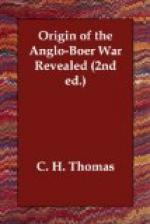Taking the fairly educated Free State and Transvaal youth, the average proficiency in English compared to that in High Dutch is as two to one, whilst many possess even a literary mastery in English whilst quite poor in the other language.
In the Cape Colony the above comparison among the Boer section is still more in favour of English.
It may be judged what an important role the educated Hollander group can take in those Republics, and are yet aiming at in the Colonies.
It is also worthy of reflection why and how the Dutch language has been raised to equality with English in the Cape Colony, seeing English was more generally understood by the Boers there than High Dutch, and none of the Boer legislators or members of Parliament even now know more than the Dutch vernacular, the High Dutch language having actually yet to be learnt by the Boer population—an important step thus gained by Afrikanerdom under the indulgent aegis of self-government, the thin end of another wedge to nurse sedition and treason introduced by that odious Bond under pretence and veil of Boer patriotism and loyalty.
As one of the world’s languages, Dutch figures under a very sorry role indeed. It had been ignored everywhere outside of Holland and her distant Colonies. The consequence to Hollanders is that they are of necessity subjected to the ordeal of learning several other continental languages for commercial intercourse, and in order to keep at all abreast with the progress of science, literature, and culture. Dutch is in the moribund stage; its salvation from imminent extinction consists in the expansion of its sphere. Boer successes in South Africa would just accomplish that.




